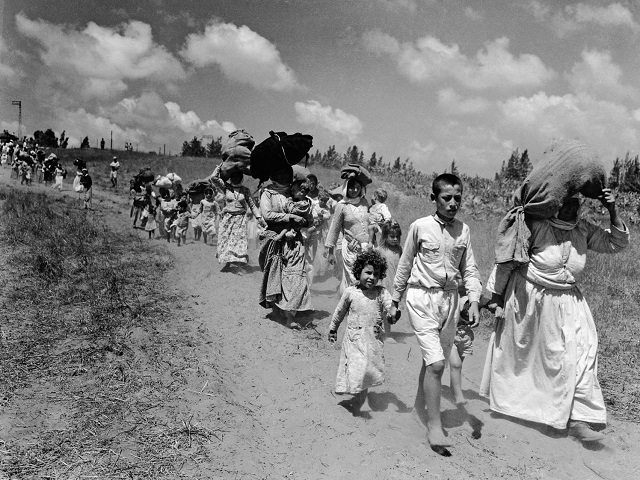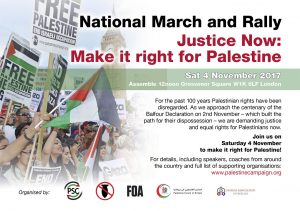The Balfour Declaration: After a Century of British Complicity; it’s Time to Make It Right Politics
New in Ceasefire, Politics - Posted on Wednesday, November 1, 2017 14:54 - 0 Comments
By Ben Jamal

Palestinian refugees leaving a village near Haifa, June 1948. (Credits: Corbis)
This is a year weighted with heavy milestones for Palestinians in their enduring struggle for justice. It has been ten years since Israel imposed an illegal blockade on Gaza, with such devastating humanitarian impact that the UN has said Gaza will become uninhabitable by 2020 unless it is lifted; and fifty years after Israel began its occupation, a process of illegal settlement-building across the West Bank and East Jerusalem continues unrelentingly, fracturing Palestinian communities in defiance of international law. But probably bearing the most weight is the centenary of the Balfour Declaration; an act of imperialism that laid the foundation for a hundred years of dispossession, displacement, and colonisation.
The UK Government has declared that it intends to mark the centenary with “pride” and this week Theresa May and many members of her Cabinet, along with the Shadow Foreign Secretary, will sit down to dinner with Israeli Prime Minister Netanyahu; the centrepiece of the UK’s celebrations. The Palestinian call for the Government to apologise for the Balfour Declaration has been waved aside. The Government responded to a petition demanding an apology with an acknowledgment that the Declaration “should have called for the protection of the political rights of the non Jewish communities in Palestine.” Leaving aside the objectionable reference to Palestinians as the “non Jewish communities”, despite the fact that Palestinians made up 90% of the population in 1917, the tone of the government’s response is not of shame, but of only mild regret. The implication is that the Declaration was an even-handed document that sought to acknowledge and protect the rights of two peoples.
In reality the essence of the Balfour Declaration was laid bare in the memo famously written by Balfour two years on, in which he stated “The Four Great Powers are committed to Zionism. And Zionism, be it right or wrong, good or bad, is rooted in age-long traditions, in present needs, in future hopes, of far profounder import than the desires and prejudices of the 700,000 Arabs who now inhabit that ancient land.”
Palestinians understood what British imperial support for Zionism would ultimately mean. Several years before the Declaration, in response to the first waves of Zionist immigration into Palestine, the Palestinian writer Abdullah Mukhlis said “we [Arabs] fear that the new settler will expel the indigenous and we will have to leave our country en masse…Palestine may be endangered. In a few decades it might witness a struggle for survival.”
So there is a tangible thread between the Balfour Declaration and the catastrophe or “Nakba” that subsequently engulfed the Palestinian people in 1948 when the state of Israel was founded upon a process of ethnic cleansing that saw 750,000 Palestinians expelled from their homes.
The Balfour Declaration led to the establishment of a state that in its foundation, and in its subsequent laws and policies, built an unjust structure of power that is exercised over disparate Palestinian communities in different, but similarly disempowering, ways.
Palestinians living in the occupied territories live under a system of military control that denies them the basic freedoms they need to build fully autonomous lives. Additionally Israel’s programme of relentless colonisation of the occupied territories sees the land available for establishing a Palestinian state diminish each year. Five million Palestinians live in refugee camps or are scattered across the globe, denied the right to return to the homes from which they were expelled in 1948 and 1967. Palestinians living as citizens of Israel, who make up 20% of the population, are denied the right to live as equal citizens under the law. Adalah, the Israeli legal rights centre, has identified over sixty-five laws that specifically discriminate against Palestinians.
Today, a more appropriate commemoration of the centenary would be a process of sombre reflection and acknowledgement of past and continuing injustices. But beyond that, what Palestine needs from us is a shift in policy. For decades, successive governments have repeated the tired mantra of support for a two-state solution, but have taken no action to hold Israel to account for its violations of international law and human rights. A start would be to go beyond talking about the illegality of Israeli settlements and to begin treating them as such by implementing a ban on the import of settlement goods, a demand made for some time by Palestine Solidarity Campaign and endorsed this year by Amnesty International.
On November 4th, thousands of people in the UK will take to the streets of London in acknowledgement of the historic debt that the UK owes to Palestinians, and with a call for a change in government policy. Our message is simple: after a hundred years, it is time for justice. It is time to make it right for Palestine.
Justice Now: Make it right for Palestine — National March and Rally
Saturday 4 November 2017. Assemble 12noon Grosvenor Square W1K 6LF London
Speakers will address the crowds at Grosvenor Square (by the US Embassy) before the march through central London (via Piccadilly Circus and Trafalgar Square) from 1pm. The rally will be taking place in Parliament Square, where the main speakers will address the crowds from 2.15pm to 4pm approx. For coaches coming from around the country please click here.
For more details visit https://www.palestinecampaign.org/



Leave a Reply